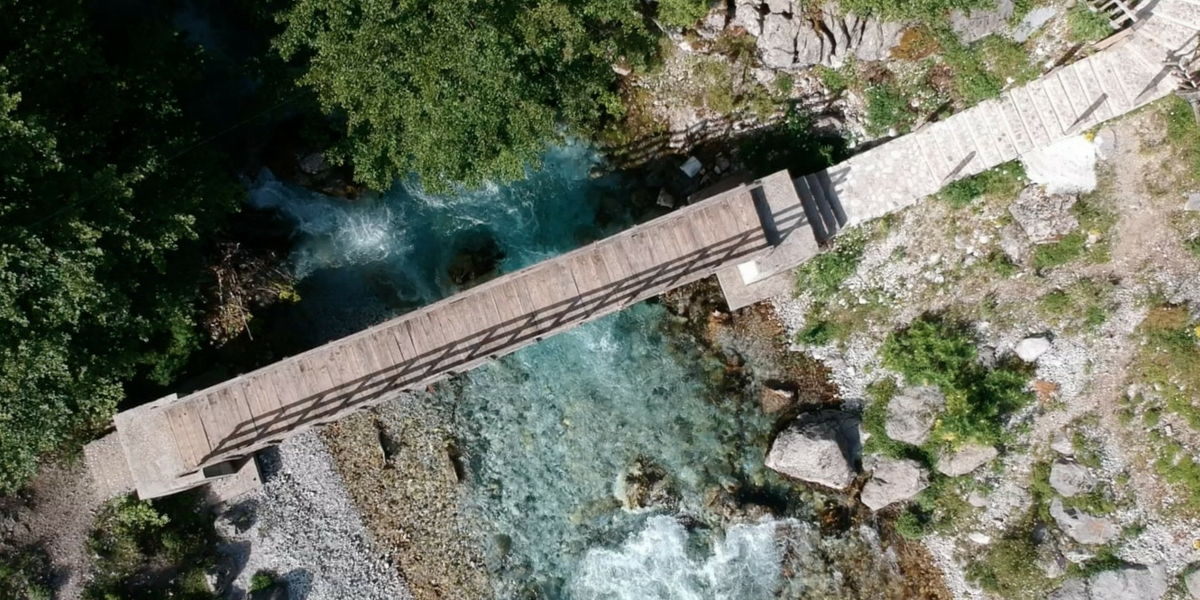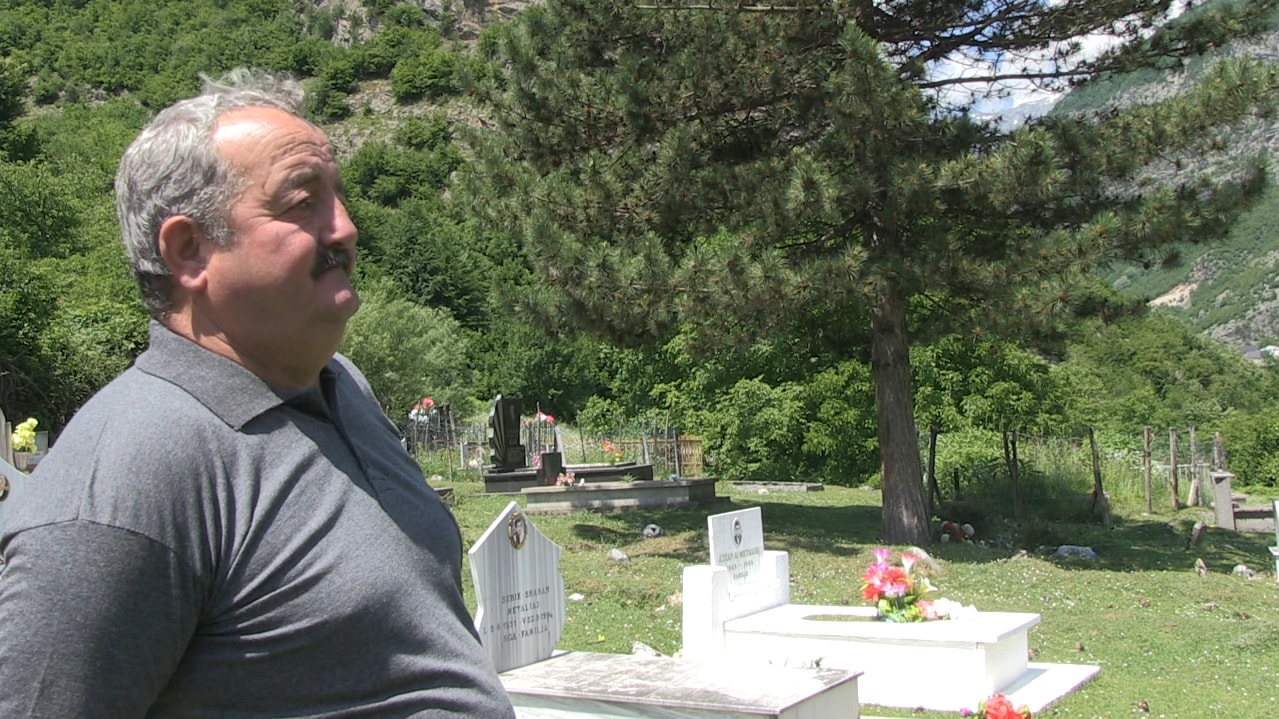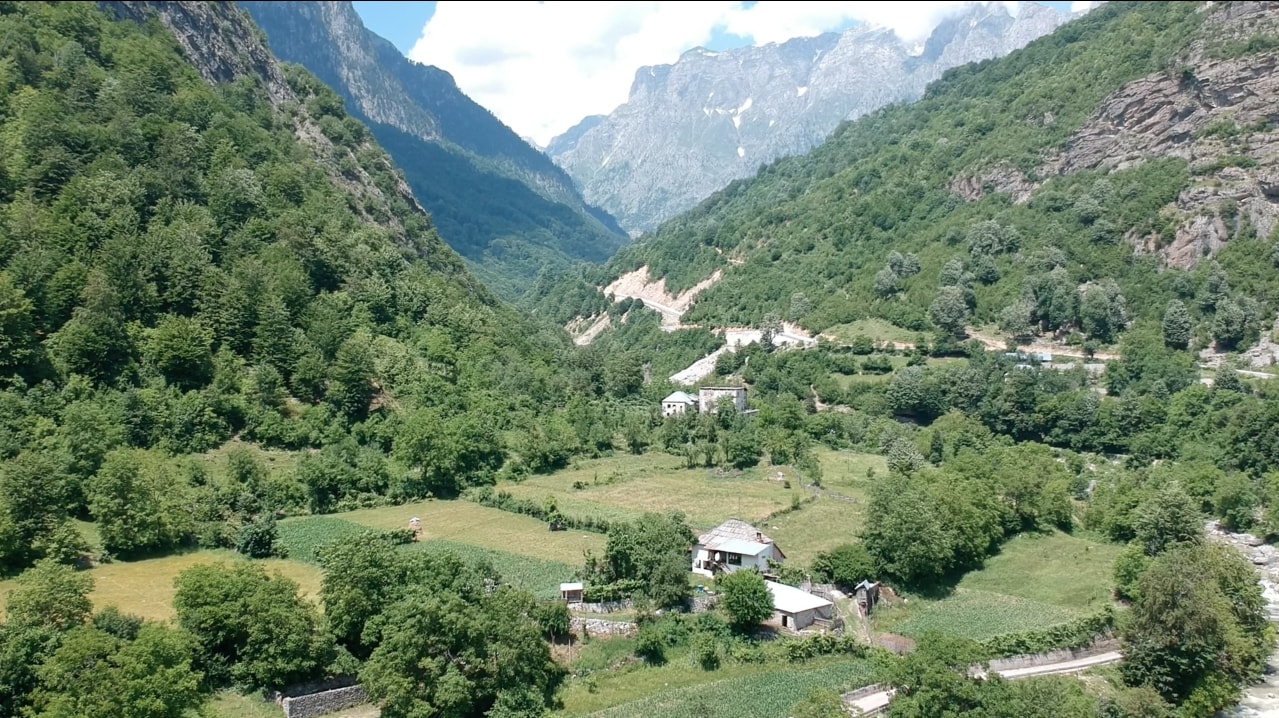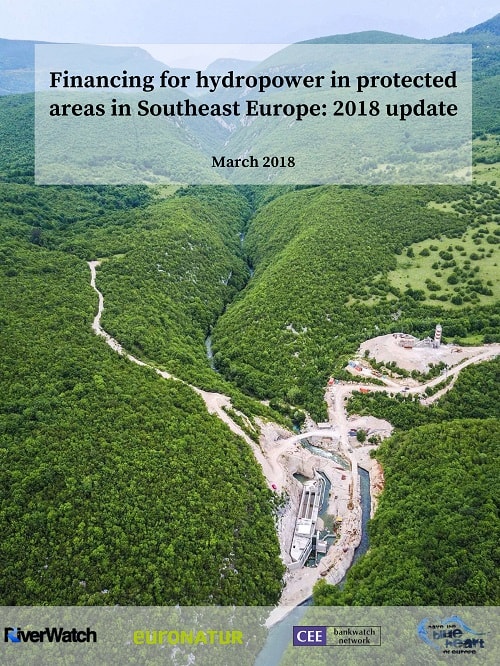Public participation is a prerequisite to functioning democracy. Environmental justice is crucial to sustainable development. But in Albania, a small, southeastern European country only recently emerging from decades-long, self-imposed isolation, democracy is still struggling to be born, and suffers from often being confused with unchecked capitalism.
David Hoffman, Catherine Bohne | 1 August 2018

Sami Ismalaj remembers his father, Ram Alia, with the empathy of a son who now has children of his own. “My father was a simple, hardworking man. He got up early everyday and worked in in the fields to provide for his children and his family.” During a recent visit to his father’s grave in Dragobi, a village in the picturesque Valbona valley national park in Albanian Alps, Sami recalled his shock at discovering in 2016 that his father and others had given their approval in 2013 for a hydropower scheme that would have a detrimental impact on the community. An impossibility given Alia died in 2010.

The project that Alia is purported to have consented to is the Dragobia hydropower plant, which has been under construction since September 2016. The Dragobia plant is just one of hundreds of similar hydropower schemes that have saturated the energy market in Albania over the last decade – a country estimated to be already 98 to 99% dependent on hydropower. As the number of hydropower projects has grown, so too have the costs to people’s rights and the environment.
Albania was one of the first nations to sign the Aarhus agreement, the United Nations convention that grants citizens the right to access information from public bodies where environmental issues are at stake. Albanian law also requires that developers, in cooperation with local governments, carry out consultations with residents. Public participation is therefore supposed to be actively pursued as part of the development process. But in the case of the Dragobi, in order to fulfill this legal requirement, the project developer, Dragobia Energy, owned by Gener 2 – one of the largest construction and civil engineering companies in Albania – claims to have held a single meeting in 2013, during the course of which 20 people gave their support for the project. Based on the testimonies of villagers during a field visit in mid-June, the list of supporters was forged and is comprised of either dead people or employees and family members of a locally based construction firm. Over two dozen community members and a local campaigning group, The Organization to Conserve the Albanian Alps (TOKA), have filed formal charges requesting a criminal investigation of the project, and three months later, the case is still pending in the public prosecutor’s office.
Anatomy of a conflict
Public participation is a prerequisite to functioning democracy. Environmental justice is crucial to sustainable development. But in Albania, a small, southeastern European country only recently emerging from decades-long, self-imposed isolation, democracy is still struggling to be born, and suffers from often being confused with unchecked capitalism. Dragobi and other faked public consultations are common, while the number of real public consultations can be counted on one hand.
However, a coalition of Albanian activists, civil society organisations and local citizens are seeking to change the status quo by demanding basic transparency in decision-making. Perhaps nowhere in Albania today is this seen more clearly than in the Valbona valley.

One of the most beautiful places in the Balkan peninsula, the Valbona valley and national park annually attracts a growing crowd of adventurous tourists from abroad who are rewarded by access to the relatively unknown and unblemished natural environment as well as the unwavering traditional hospitality of the locals. But in spite of its protected status as an IUCN category II national park – the second strictest level of internationally-recognised protection – Valbona valley national park remains under attack from developers seeking to turn it into a hydropower hub, pumping tonnes of concrete into building dams and diversion tunnels in order to extract energy from the wild and crystal clear Valbona river and its tributaries.
One such company is Gener 2, the Albanian firm behind the 2016 Dragobi scheme, who were also involved in building a controversial pipeline crossing the south of Albania that will transport Azeri gas across centuries-old olive groves. The Gener 2 attack on pristine nature in Valbona valley is one example of the hydropower rush in Albania, as well as more widely in the Balkans, motivated by hefty subsidies for hydropower projects, and power-purchase agreements ensuring steady profit margins for investors. Despite worrying reports about climate change impacts that will affect the availability of water, the ‘fuel’ of hydropower projects, the industry boom shows no signs of slowing….
https://bankwatch.org/blog/environmentalism-and-democracy-on-the-rise-in-albania







navy
Aug. 17, 2018., 07:51 •
Umweltstudien werden gezielt gefälscht, das Gemeindeeigentum gestohlen. Die Umweltgutachter sitzen am Schreibtisch, schreiben was ihre Mafiösen Auftraggeber wünschen, was an das Deutsche Institutut für Lebenssicherheit erinnert, was 1 : 1 Monsanto Gutachten übernimmt. Lefter Koka, ein berüchtigter Mafiosi auch lt. wikileaks, wurde sogar Umweltminister in Albanien, der vorbestrafte Drogenboss: Fatmir Mediu sein Vorgänger und immer Deutsche Politiker dabei. die Finanz- und Baumafia in Folge. Wer finanziert diese Projekte finanziell arbeiten? „Jeder, der genug Geld hat, der Besitzer eines Mini-Wasserkraftwerk werden können“, erklärt Jelena Ivanic und fügt hinzu, dass sich die Investition Gewinn in sieben Jahren erzeugt. Die Finanzierung erfolgt durch den Staat und Darlehenszuschüsse erfolgt durch Kreditinstitute wie die Weltbank, die Europäische Bank für Wiederaufbau und Entwicklung, EBRD, oder von der Europäischen Investitionsbank, Societe Generale von Frankreich, Uni Kredit aus Italien, Raiffeisen und Erste Bank aus Österreich und der KfW aus Deutschland. http://www.gazetadita.al/thesari-yne-i-perbashket-po-privatizohet/
navy
Aug. 23, 2018., 18:23 •
Gener - 2, arbeitete in vielen Fällen mit gefälschten Dokumenten, weil man eigene Mafia Notare hat. Verantwortlich für die Zerstörung Antiker Stätten, der National Strassen, weil man auch Glas Faser Kabel verlegte, mit Wild West Kanal Röhren, dabei die Nationalstrassen zerstörte. Alles im Auftrage unbekannter PHANTOM Firmen Edmond Haxhinasto war Minister, womit Alles gesagt ist mit dem Nachfolger Sokol Dervishi, Partner der Deutschen Botschafterin Susanne Schütz im kriminellen Enterprise http://www.gazetadita.al/rruget-e-demtuara-qindra-kilometra-kanale-u-hapen-per-fibrat-optike/
navy
Dez. 13, 2018., 22:07 •
Die korrupte EU Botschaft, residiert im illegal errichteten "ABBAS" Büro Centrum, finanziert auch weitere Gangster wie Bledi Mane und die BaLFIN Gruppe.
Bashkim Ulaj, der Tropojaner produzierte mit 11 Notaren, gefälschte Dokumente für 26 Phantom Betrugs Firmen. Der Super Skandal, mit den gefälschten US Dokumenten rund um DH-Albania, der Mutter Phantom Firma im US Staat Delaware, war nur besonders dreist.Avdjol Dobi, 26 Jahre, der Geschäftsführer der Phantom Firma, hält sich im Ausland illegal auf seit 8 Monaten
Die EU Ratten: Sylvain Gamber, Romana Vlahutin, Andi Dobrus
Das FBI übernimmt nun die Ermittlungen wegen gefälschten US Dokumenten der Albaner Regierung
Bashkim Ulaj, dosje false dhe 26 firma hije, ja shkresa që provon, se ka “folur” me të vdekurit, për 9 HEC-et e Valbonës
navy
Juli 31, 2019., 04:26 •
Mit total gefälschten Grundstücks Urkunden, der EU Partner und vor 10 Jahren bekannt: die berüchtigte Tropje Betrugs Baufirma: Gener-2, mit Taliban Systemen der Zerstörung auch Antiker Städte
navy
Feb. 24, 2020., 22:44 •
Es werden weiter Wasserkraftwerke finanziert in Nord Albanien, trotz UNESCO Kultur Erbe und wo die bekannt, korrupte Ministerin, die Annullierung versprach, ohne Rücksprache mit den zuständigen Bürgermeister, keinen Umwelt Gutachten VIDEO: Përplasje edhe në Mat për ndërtim HEC-esh, lejet nuk ndalen February 24, 2020 22:22 VIDEO: Përplasje edhe në Mat për ndërtim HEC-esh, lejet nuk ndalen Banorët e Matit vijojnë protestat kundër ndërtimit të Hecit pranë Parkut Kombëtar të Zall-Gjocaj. Teksa janë në pritje të seancës së radhës gjyqësore, banorët bëjnë thirrje që kompania të tërhiqet nga punimet. Megjithëse i kundërshtoi fort në opozitë, qeveria Rama ka vijuar miratimin e HEC-eve të shumta. Vetëm në një mbledhje, Këshilli Kombëtar i Territorit ka miratuar pesë leje të reja ndërtimi për hidrocentrale si dhe ka rishikuar një tjetër ekzistuese. Në korrik të vitit të kaluar janë miratuar lejet e ndërtimit për HEC Dritën në Lumin e Gashit, Bashkinë e Tropojës, qarku Kukës me subjekt shoqërinë “Breçani – R.O.S.P” sh.p.k. Lumi i Gashit edhe pse njihet pak, konsiderohet si një perlë e natyrës në veri të vendit. Ai është pjesë e Rezervës Strikte dhe Trashëgimisë Botërore të UNESCO për shkak të vlerave që paraqet. Një tjetër leje në fakt që nuk pritet të kalojë pa zhurmë është për dy HEC-e të reja që shkojnë deri në derdhjen e lumit Urakë. Bëhet fjalë për leje Ndërtimi për objektin: “Ndërtimi i Hidrocentraleve “Shutri 1” dhe “Shutri 2”, në pellgun ujëmbledhës të lumit të Shutrisë si dhe burimet ujore të Shutrejës deri në derdhje në lumin e Urakës, Bashkia Mat”, me subjekt zhvillues shoqërinë koncesionare “ATEANI” sh.p.k. Lumi Urakë u vendos në qendër të vëmendjes pak muaj më parë pas protestave të vazhdueshme të banorëve të zonës të cilët kundërshtonin me ngulm ndërtimin e dy hidrocentraleve. http://www.gazetadita.al/rikthim-te-hec-et-qeveria-miraton-5-te-tjere-nje-ne-rezerven-e-unesco/
Die EU Gangster im Bestechungs Motor für die TAP Aserbeidschan Mafia – Marina Durres – Albanien
Apr. 08, 2021., 13:16 •
[…] Die Wasserkraft Werks Mafia im Balkan: Gener 2, EU finanziert […] Rama Claims Vjosa Story “Is Over” Despite Failing to Protect it Through National Park Designation From: Alice Taylor 23 hrs ago Rama Claims Vjosa Story “Is Over” Despite Failing to Protect it Through National Park Designation Albanian Prime Minister Edi Rama has spoken out on the local and international calls to designated the Vjosa River as a National Park. On the electoral campaign trail this week, he said that he has designated it a “protected area”. “We started the debate on Vjosa, it’s a protected area, not a national park, hydropower plants are not being built in Vjosa…There are no hydropower plants to be built in Vjosa, I cannot stop agrotourism in the whole valley…The story is over.” Rama has still not declared the Vjosa as a National Park, and this is the primary call from international organizations, activists, celebrities, and local stakeholders. A protected area does not provide the same level of protection as a National Park. On December 28, 2020, the National Council of the Territory (KKT) chaired by Rama, approved new boundaries of protected areas. The meeting was held in secret and the notification of the event was only published afterward. Little information was made public on what happened in the meeting, despite a legal requirement to publish it. https://exit.al/en/2021/04/07/rama-claims-vjosa-story-is-over-despite-failing-to-protect-it-through-national-park-designation/